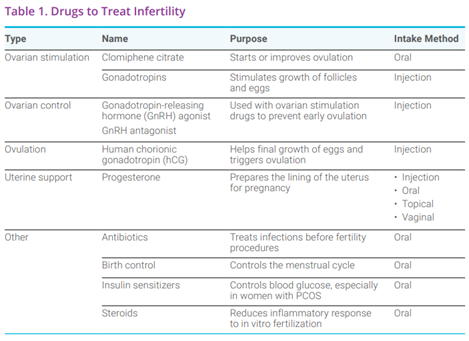Supporting Infertility Patients During National Infertility Awareness Week

Dealing with infertility might feel disheartening to patients, especially at first. But understanding their diagnosis can help patients take control of their health. Many treatment options and lifestyle changes can help patients improve their health and increase the chances of pregnancy. Most infertility cases — about 85% to 90% — are treated with conventional therapies, including medication or surgery. This article discusses the medication therapies for treating infertility as well as how specialty pharmacists help patients manage their therapy.
Medications
Certain drugs are approved to help women with issues that might be preventing pregnancy.2 Table 1 lists drugs commonly used to treat infertility. These are often prescribed with lifestyle changes and other treatments.3,4

Managing Medications and Side Effects
In most cases, patients must take fertility drugs at certain times during the reproductive cycle. This means patients must keep track of days, times and doses. They might need to do this for more than one medication. Here are a few ways to keep things straight:
• Label and organize drugs and supplies. This can make them easier to find. It can also help prevent a mix-up of medications.
• Make portable containers of drugs and supplies. These can help patients stay on track when away from home. Be sure to note storage recommendations and prepare for those requiring refrigeration.
• Mark days and doses on a calendar. Check them off after you take your medication.
• Set computer or phone alerts for each dose.
• Talk with your doctor about medication and possible dosing changes if you will be traveling across time zones.
• Follow basic steps for drug safety:
o Follow manufacturer storage instructions.
o Do not reuse needles.
o Dispose of needles in a sharps container.
o Tell your doctor right away if you miss a dose or mix up medications.
o If it gets too hard to stay on track, ask your treatment team for other tips. You can work together to make things easier to manage.
Fertility drugs do have side effects.2,5 Some can cause discomfort during treatment. Common side effects might include2,5 mild bloating, breast tenderness, headaches, hot flashes, mood swings, nausea, or soreness at injection sites. It’s important that patients do not stop taking their medication. Instead, they should call their provider first, and ask about ways you might be able to minimize side effects during treatment.
How AllianceRx Walgreens Pharmacy Supports Patients
AllianceRx Walgreens Pharmacy has an expert understanding of the fertility process. Our team members know that timing and personalized treatment are key and are committed to supporting our patients throughout their journey to have a family. We offer:
• Access to pharmacists — even on holidays — with telephone support 24/7.
• Insurance verification coordinators who help manage and maximize patients’ fertility benefits.
• Free overnight tracked shipping* with discreet insulated packaging, so medications that require special handling arrive safely.
• Interactive guides (our Understanding Fertility patient booklet and Fertility Medication Guide are also available in Spanish).
*Sunday delivery not available
At AllianceRx Walgreens Pharmacy, our Fertility Order Review (FOR) program helps patients prepare to self-administer fertility medications. This service offers direct access — at no additional cost — to an experienced fertility nurse who can provide compassionate support for each patient’s specific needs.
On the day the first medication order arrives, a fertility nurse will call to help patients:
• Review the contents of their order.
• Understand the purpose of each item and how to store the medication.
• Access our online guides for administering self-injections, medication information and fertility education.
• Stay aware of expiration dates and set up refill reminders.
• Answer any medication questions patients may have.
In addition, the AllianceRx Walgreens Pharmacy Specialty360 Reproductive Health team is available to provide patients with dependable, personalized support to help them manage medication side effects and stay on track with their prescribed therapy. We look forward to helping our patients get the best results from their treatment.6,7,8
References
Condition Guide: Understanding Infertility
¿Qué es la infertilidad?
Medication Guide: Step-by-step instructions on how to take specific fertility medications
Guía de medicamentos: Instrucciones paso a paso sobre cómo administrar ciertos medicamentos para la fertilidad
Sources:
1 Quick facts about infertility. Reproductivefacts.org Web site. https://www.reproductivefacts.org/faqs/quick-facts-about-infertility/. Accessed January 26, 2021.
2 Medications for inducing ovulation. Reproductivefacts.org Web site. https://www.reproductivefacts.org/news-and-publications/patient-fact-sheets-and-booklets/documents/fact-sheets-and-info-booklets/oral-medicines-for-inducing-ovulation/ Published 2014. Accessed January 26, 2021.
3 FAQs about infertility: what causes infertility? Reproductivefacts.org Web site. https://www.reproductivefacts.org/faqs/frequently-asked-questions-about-infertility/ Published March 2017. Accessed January 26, 2021.
4 Infertility. Centers for Disease Control and Prevention National Center for Health Statistics Web site. Infertility FAQs. https://www.cdc.gov/reproductivehealth/infertility/ Updated January 16, 2019. Accessed January 26, 2021.
5 Side effects of injectable fertility drugs (gonadotropins). Reproductivefacts.org Web site. https://www.reproductivefacts.org/news-and-publications/patient-fact-sheets-and-booklets/documents/fact-sheets-and-info-booklets/side-effects-of-injectable-fertility-drugs-gonadotropins/ Revised 2012. Accessed January 26, 2021.
Back to Blog > Blog Stories



